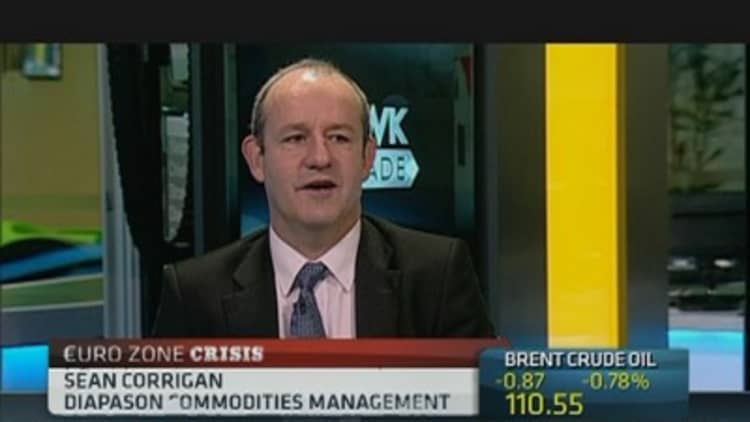The euro zone’s latest bailout fund hasn’t even come into existence yet, and there are already high-level discussions about whether it can be leveraged to more than $2.6 trillion — more than five times its planned lending capacity.
“When you get to 2 trillion and that’s not enough, you might think that you might be on the wrong track about finding a solution, but not with Europe,” Sean Corrigan, chief investment strategist at Diaspora Commodities Management, told CNBC Monday.
He added: “We have the idea that everything will be done, that there is no number of noughts to the rescue package through whatever wheeze they can do to avoid all the legal technicalities. They then promise their own electorates they will be obeying them.”
When it was first announced earlier this year, the European Stability Mechanism (ESM) sparked a rally in markets, as it looked like a key part of the solution to the euro zone debt crisis which had sent markets yo-yoing for months. (Read More: Draghi's Efforts to Out-Bluff Markets.)
However, as Spain and Italy have looked more likely to be in need of a full bailout, and German grumbles have got louder, worries have grown about its size. (Read More: Will New Euro Zone Bailout Fund be Big Enough?)

The ESM is one of the key tenets of euro zone leaders’ attempts to fight the debt crisis which threatens to spread its tentacles ever further. It’s expected to come into force later this year, as a replacement for the European Financial Stability Facility (EFSF), and is dependent on contributions from euro zone member states. Germany, the region’s largest economy which is already expressing unease about the cost of saving other, more troubled economies, is its biggest contributor.
Germany’s Deputy Finance Minister told Reuters on Monday that discussions about leveraging the fund are “going on” — but assured German voters that the Bundestag, the German lower house of parliament, would be consulted.
The reports were not received particularly favorably by stock markets wearied by constant twists and turns in the euro zone’s attempts to solve its debt crisis. (Read More: .)
On Monday, European equity markets opened lower despite a report in Der Spiegel magazine that the to more than $2.6 trillion.
Euro zone governments are looking to use public money for riskier transactions like bond-buying and leverage private capital to provide a bigger bailout fund for the region’s struggling economies.
Carl Weinberg, chief economist at High Frequency Economics, warned that “safe debt in Euroland” — particularly German Bunds, the classic safe-aven bond — may come under fire as the costs of the ESM become more apparent.


